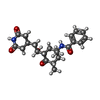+Search query
-Structure paper
| Title | Discovery of C13-Aminobenzoyl Cycloheximide Derivatives that Potently Inhibit Translation Elongation. |
|---|---|
| Journal, issue, pages | J Am Chem Soc, Vol. 143, Issue 34, Page 13473-13477, Year 2021 |
| Publish date | Sep 1, 2021 |
 Authors Authors | Yumi Koga / Eileen M Hoang / Yongho Park / Alexander F A Keszei / Jason Murray / Sichen Shao / Brian B Liau /  |
| PubMed Abstract | Employed for over half a century to study protein synthesis, cycloheximide (CHX, ) is a small molecule natural product that reversibly inhibits translation elongation. More recently, CHX has been ...Employed for over half a century to study protein synthesis, cycloheximide (CHX, ) is a small molecule natural product that reversibly inhibits translation elongation. More recently, CHX has been applied to ribosome profiling, a method for mapping ribosome positions on mRNA genome-wide. Despite CHX's extensive use, CHX treatment often results in incomplete translation inhibition due to its rapid reversibility, prompting the need for improved reagents. Here, we report the concise synthesis of C13-amide-functionalized CHX derivatives with increased potencies toward protein synthesis inhibition. Cryogenic electron microscopy (cryo-EM) revealed that C13-aminobenzoyl CHX () occupies the same site as CHX, competing with the 3' end of E-site tRNA. We demonstrate that is superior to CHX for ribosome profiling experiments, enabling more effective capture of ribosome conformations through sustained stabilization of polysomes. Our studies identify powerful chemical reagents to study protein synthesis and reveal the molecular basis of their enhanced potency. |
 External links External links |  J Am Chem Soc / J Am Chem Soc /  PubMed:34403584 / PubMed:34403584 /  PubMed Central PubMed Central |
| Methods | EM (single particle) |
| Resolution | 3.2 - 4.1 Å |
| Structure data | EMDB-23785, PDB-7mdz:  EMDB-23787: |
| Chemicals |  ChemComp-MG:  ChemComp-ZN:  ChemComp-Z2V: |
| Source |
|
 Keywords Keywords | RIBOSOME / 80S mammalian ribosome / translation inhibitor |
 Movie
Movie Controller
Controller Structure viewers
Structure viewers About Yorodumi Papers
About Yorodumi Papers






